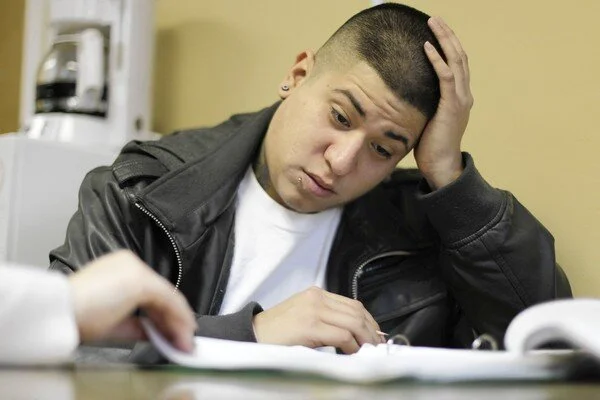LYDIA Featured in Chicago Tribune
Help is at hand for kids at risk and students who have given up on themselves
by Ashley Rueff, Chicago Tribune reporter on December 07, 2012
When he was 14, Ivan Ortiz gave up on himself and his shot at a good life.
The high school freshman didn't know how to read and said a learning disability and attention deficit hyperactivity disorder made going to class pointless.
"No teachers would be like, 'Come on, you can do this,'" Ortiz said. "So I would be like, 'Oh, I'm never going to become anything in life, so let me just act a fool.'
"For a year and a half, he skipped most of his classes at Schurz High School and instead spent his time using drugs. Then four years ago, Ortiz enrolled at the Urban Academy-Chicago, an alternative, accredited high school run by nonprofit Lydia Home Association.
The school offers a different learning environment for students who struggle with traditional settings. There, Ortiz found teachers who cared about him and knew how to help him.
With their support, he began to care about his education. Because of the school's random drug-test policy, he realized he could think more clearly when he stopped getting high before school.
Now the 20-year-old is on track to earn his high school diploma this month, an important milestone for someone who at one time had accepted the fact that he would never be able to read.
"It's going to mean a lot because I could have been in the streets right now," he said. "Who knows where I would have been."With his diploma, Ortiz is hopeful he will be able to start a career in the trades so he can build a nice life for his own family, including his 1-year-old daughter, Aliyah.
"Without this place, I don't know where I would have been," he said. "I would never have gotten out of the path of drug use. I would have been hanging out with the same people."Ortiz is one of 26 students attending the school operated by Lydia, an organization with a mission to help parents care for their children or to support those children when their parents cannot. It is one of many organizations supported by Chicago Tribune Holiday Giving, a campaign of Chicago Tribune Charities, a McCormick Foundation Fund.
Lydia Home Association, a faith-based group, was created nearly 100 years ago with the goal of supporting Chicago-area orphans. Through the years, its services have expanded to serve more than 2,000 families a year.
Executive Director David Anderson said the organization today still runs a residential treatment program where about 40 children live at any given time. Often the residents, ages 8 to 16, have been abused or neglected by their caregiver, but they struggle when placed in foster care.
"They have to come here and get back on their feet," he said.
Its other services include Lydia's foster care program, which regularly places about 80 kids with families, and an outpatient counseling service that helps families deal with issues that can cause unhealthy environments for children.
Another specialized program called Families First targets at-risk soon-to-be and new mothers in Chicago's Austin neighborhood, proactively guarding against future child abuse."It's to help them kind of care for their kids," Anderson said. Through home visits, staff work with mothers to help them with parenting skills and connect them with support services when they're needed. The program serves about 50 families."We support parents to care for their children," Anderson said. "We care for children when their parents can't.
"Lydia's largest program, Safe Families, is on track to serve more than 1,000 children this year. If parents can't care for their children, the program will place them with volunteer families long enough for the parents to overcome their obstacles. Often that comes in the form of homelessness, Anderson said, but it can also occur when a parent is dealing with an illness or other stresses."We can support that parent, help get them back on their feet and potentially prevent harm from happening," Anderson said.
Most of the children are under the age of 5, and their stays may last anywhere from one day to one year, Anderson said. About 800 families in the Chicago area participate in the program without compensation.
"It's almost meant to be extended family," he said. "It just gives (parents) a break."Lydia receives state funding for programs like its residential center and foster care program, but others, like the high school and counseling, are funded with donations and fees. Anderson said about 25 percent of Lydia's $8 million annual budget comes from donations.arueff@tribune.com

